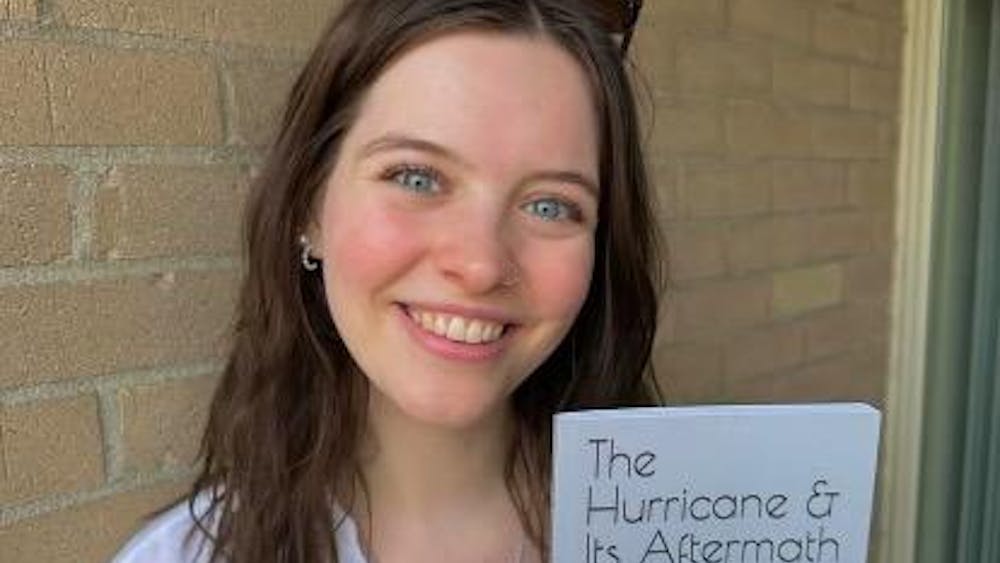A panel consisting of Michigan’s first female Chief Deputy Attorney General Carol Isaacs, Assistant Attorney General Kelly Carter and Attorney General Crime Victims’ Advocate John Lazet discussed the issue of human trafficking in the state of Michigan. Eastern Michigan University students, faculty and members of the Ypsilanti community joined the conversation in the Student Center Tuesday morning as part of the Women’s History Month series of events at EMU.
The discussion revolved around the 2013 Report on Human Trafficking by the Michigan Commission on Human Trafficking, a report Isaacs, Carter and Lazet were instrumental in creating.
EMU President Susan Martin, provided the opening remarks for the panel discussion.
“I particularly want to welcome Carol Isaacs,” Martin said. “Proud to see women in the leadership [role] in the attorney general’s office.”
Martin also spoke about how the university first became concerned with the issue of human trafficking.
“Regent [Beth] Fitzsimons and I first became interested in this when we saw a website that was soliciting college girls to apply to be ‘companions’ so that they could get their college education paid for by gentlemen that wanted ‘companionship,’ and we became rather alarmed by that,” Martin said.
Carter wanted to be sure the audience knew exactly what they were talking about when they discussed the crime of human trafficking.
“Human trafficking is a crime of exploitation, not transportation,” Carter said. “It’s really about a vulnerable victim and a person willing and able to exploit that vulnerability.”
Carter highlighted the two types of human trafficking: sex trafficking and labor trafficking, both of which are prevalent in Michigan.
Isaacs, who works for attorney general Bill Schuette, explained human trafficking was one of Schuette’s “coming in the door initiatives.”
She explained the issue of human trafficking is not just an international issue. It happens in the United States and it happens all over Michigan.
Isaacs also said that the 2013 Report on Human Trafficking she and other committee members worked on is a victim-centered report.
“Policy recommendations are looking at this issue from the victim’s perspective,” Isaacs said. “We needed to firmly address what [this issue] meant to the victims here in the state of Michigan.”
Carter explained that many of the victims of human trafficking in Michigan are young girls, often minors, who are caught in the classic “pimp and hoes” form of prostitution.
“The ‘old-fashioned pimp’ is using physical violence to control somebody – to force them to engage in the act of prostitution – that is human trafficking,” Carter said. “That’s a person who’s vulnerable – the victim – who for whatever reason finds themselves in the circumstance where she’s with this individual…then you have a willing individual who’s prepared to take advantage of that vulnerability.”
Lazet explained that the violent and stressful relationships victims have with their traffickers can seriously traumatize them and cause a lot of damage to the victim’s psyche. He said that one of the main goals of the fight against human trafficking in Michigan is to provide victims with the proper care they need after they are freed.
Michigan’s 2013 Report on Human Trafficking recommends the state establish more dedicated housing facilities for human trafficking victims.
EMU senior and psychology major Brittni Johnson is motivated to create such a safe haven for victims of human trafficking.
“These survivors and victims need help,” Johnson said. “I want to start something like that in Detroit.”
EMU junior Adrienne Dunlevy wanted to hear more about what Michigan plans to do once they rescue the victims of human trafficking.
Lazet said they are working with a concept called “trauma-informed programming” to build residential safe-havens for victims of human trafficking centered around catering to the specific needs of the victims.
“I’m more hopeful, but it’s a dim hope because it is a slow process,” Dunlevy said. “There’s not enough focus on what happens [to the victims] afterward.”








